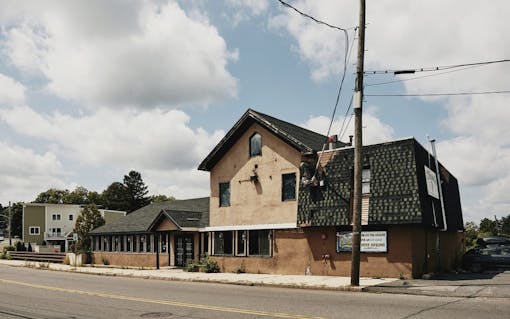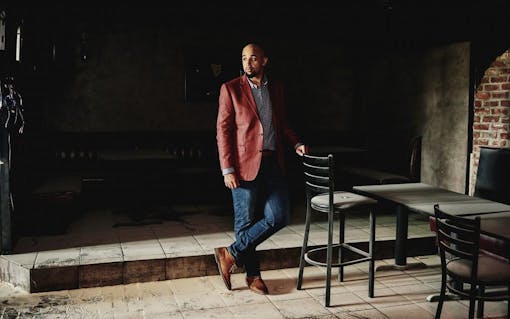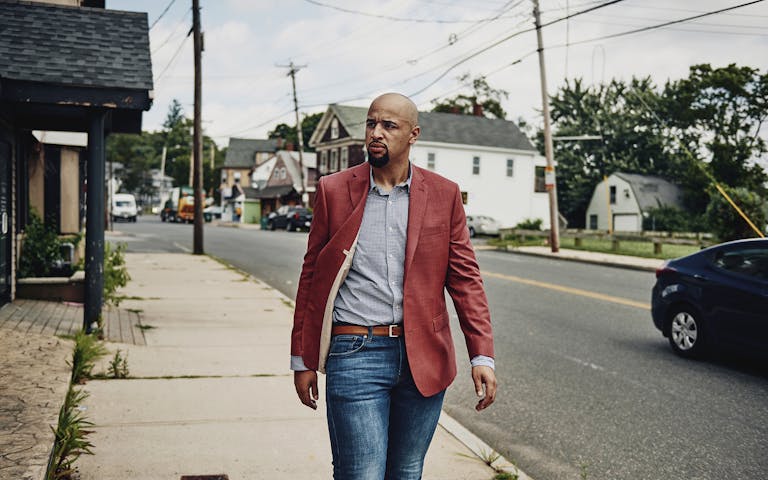On the morning of July 22, Jordan Avery unlocked the door at 829 Boston Street, a shambling, two-tone gray and tan building in Lynn, Massachusetts. The 4,000-square-foot edifice, which sports a deck overlooking the Saugus River, is adorned with a prominent sign for O’Brien’s, a restaurant, pub, and live music venue that no longer exists. Avery is converting part of the space into Massachusetts Green Retail, an adult-use cannabis shop approved by Lynn city officials earlier this year.
Vandals trashed Jordan Avery's shop and left a noose hanging from the ceiling. And that's not the weirdest part of the story.
When Avery stepped inside that Monday morning, he stood and gaped in shock: Someone had broken in the previous night and scrawled racist and anti-Semitic epithets on the walls, sprinkled an unknown white powder across the floor, and suspended a rope from the ceiling, knotted in the unmistakable form of a noose. Avery is a 25-year-old black man who plans to convert to Judaism. The building’s owner is Jewish.
As news of the racist acts of vandalism spread, many people—including Sen. Elizabeth Warren, Gov. Charlie Baker, and many colleagues in the cannabis industry—reached out to Avery with reassuring words and encouragement to keep going. “There’s been a tremendous amount of support from across the commonwealth [of Massachusetts], but not only that, from across the country,” he told me during an interview last week.
But Massachusetts Green Retail’s existential struggle is far from over.
Part of a Longer Struggle

When Lynn, MA, native Jordan Avery (top photo) arrived to start transforming a former dive bar into his cannabis shop, he discovered that racist vandals had gotten there first. (Tony Luong for Leafly)
Pause here and consider this for a moment: if some unknown hater had simulated a lynching in your building and you then received a Twitter shoutout from a governor and a leading presidential candidate, chances are that would be the most memorable chapter of your summer.
That’s not the case for Jordan Avery. In fact, his fight to open a simple mom-and-pop cannabis shop had turned into one of the strangest legal battles of the post-prohibition era. And that was before the events of July 22. In fact, in the days and weeks ahead, the Massachusetts Green Retail story may get even weirder.
One Toke Over the Line?

(Tony Luong for Leafly)
A little less than three months before the vandals’ attack, Avery learned from Lynn officials that his proposed business plan had come under assault from a different, and potentially more problematic, source: the next town over.
On April 29, in an extremely rare legal maneuver, the neighboring town of Saugus filed suit against Lynn for approving Avery’s business application.
According to Saugus officials, a few inches of the cannabis store falls within their town. And cannabis is banned in Saugus.
To understand why, back up to 2016. That year, 53.7% of Massachusetts residents approved Question 4 in the 2016 election, voting to legalize cannabis. Voters in Lynn approved the measure by a slightly smaller plurality, after which city officials began the process of licensing adult-use cannabis stores. After a lengthy permitting process, eight approved cannabis shops will begin to open in Lynn later this year.
The people of Saugus, meanwhile, rejected Question 4, with 53.3% of the populace voting against the measure. Saugus town officials chose to “opt out” of legalization. It’s still legal to possess and consume (in private) in Saugus, but the town will allow no cannabis businesses to operate within the city limits—not even, it turns out, if only a minuscule fraction of said business was actually located in Saugus.
Shop highly rated dispensaries near you
Showing you dispensaries nearAccording to the town’s complaint filed in Land Court, “approximately 10 inches of [Massachusetts Green Retail’s] building,” plus part of the deck, a dumpster, and some parking, spills over the Lynn line into Saugus. The actual amount may be as few as two inches, says James Lamanna, assistant city solicitor for the city of Lynn. No one can be certain until a surveyor makes a determination.
Those few inches demonstrate how, despite voters continuing to sign off on legalization, America remains balkanized, even at a hyper-local level.
Saugus Opts Out, Lynn Opts In

The damage included anti-Semitic messages, black paint, and white powder strewn over everything. (Tony Luong for Leafly)
While Saugus has doubled down on its opposition, Lynn has fully backed the new cannabis shops, forming agencies to screen business applications and help their owners find locations in different areas of town. The city will bank a 6% cannabis retail sales tax for its trouble. Lamanna says that after some initial reluctance, Lynn’s city council began to see that allowing cannabis stores was merely a matter of facilitating the will of the people.
Town officials want Avery to file a 'transportation security' plan for store customers who drive through Saugus. A what now?
The trick for Saugus is that it can’t sue Lynn on the grounds that it would rather not have a cannabis dispensary nearby. Debra Panetta, chairwoman of the Saugus Board of Selectmen, acknowledges that while Saugus firmly opposes recreational marijuana—one town meeting ended with a unanimous no vote— the town’s lawsuit is all about infrastructure-type issues: the parking is in Saugus, where cannabis is prohibited; the store’s heavy traffic will exacerbate conditions at a “very dangerous three-way intersection;” the building is located in a residential neighborhood. The lawsuit also notes that people buying cannabis at the store will then be driving through Saugus streets, and that Avery’s plan fails to address “transportation security.”
Lamanna counters that Massachusetts Green Retail will share the building with an established pizza shop that is also planning to move into a portion of the old O’Briens, and the designated parking spots for the cannabis shop will all be on the Lynn side of the parking lot.
Traffic Is Traffic Is Traffic

The building in question: 99% of the structure is in Lynn. A few inches of one corner may cross the town line into neighboring Saugus. (Tony Luong for Leafly)
As for the traffic concern, Avery’s defenders point out that the Boston Road building has historically been operated by businesses that generate lots of traffic, and Saugus never raised any of these issues before. In various public meetings, Lamanna says, “I never heard anyone articulate how cannabis traffic is different than restaurant traffic.”
The location is surrounded by other businesses, including a busy Dunkin’ just over the town line and a new restaurant situated diagonally across the road in Saugus. “Nothing has changed with the building,” says Sam Vitali, the attorney who shepherded Avery’s proposal through Lynn’s licensing process. “What’s changing is that after 35 or 40 years, Saugus is making these complaints based on the fact that they don’t want marijuana being sold there.”
‘It’s Not the Republic of Saugus’

Avery, above, has been battling to secure a state cannabis retail license, but the boundary issue must be settled before that can happen. (Tony Luong for Leafly)
Lamanna and Vitali both believe it’s impossible to evaluate the lawsuit and not conclude that Saugus is trying to create a legally enforceable Mason-Dixon Line simply because the town is opposed to cannabis sales. “Saugus is reaching for straws, in my judgment, by making a political argument that they don’t want marijuana,” Vitali says. “Unfortunately for them, it’s not the Republic of Saugus. Saugus is part of the commonwealth of Massachusetts, which has been heard on this issue.”
How could two towns bunched so close together stand so far apart on this issue?
The answer might lie in the nature of the towns themselves.
A Tale of Two Towns

Vandals took pains to soil as many surfaces as possible. (Tony Luong for Leafly)
Lynn has long had a reputation, deserved or not, of being a place of freewheeling morals, so much so that several generations back it earned the nickname “City of Sin,” complete with an accompanying poem. There are several variations, but one includes these verses:
Lynn, Lynn, the city of sin
You never come out the way you came in
You ask for water, but they give you gin
Lynn once led the world in shoe production, and the Lynn Commons, a grand rectangular park bisecting part of downtown, hints at both past grandeur and more recent struggles. Large swaths of industry vanished decades ago. Lynn has been in transition ever since, retaining its sensibility as the kind of diverse, muscular Boston-area cityscape in which Dennis Lehane novels are set. These days it’s on the upswing, its embrace of public arts manifesting in massive murals checkerboarding the downtown.
Like Lynn, Saugus shares a Massachusetts North Shore blue-collar vibe. It’s an unpretentious middle-class town with less than a third of the population of Lynn. But Saugus is much whiter (nearly 91%, according to the 2010 census, versus 47% of Lynn), and more prosperous (the average household income of $82,000 is about $30,000 higher than Lynn’s). Unsurprisingly, Saugus is more conservative: the town went for Donald Trump in 2016, whereas Hillary Clinton dominated in Lynn, winning 67.5% of the vote.
Lynn Born and Raised

(Tony Luong for Leafly)
Massachusetts Green Retail owner Jordan Avery is a Lynn native. He’s also an embodiment of the kind of entrepreneur the cannabis industry needs right now: a young, thoughtful, community service-oriented black man who wants to create jobs and sink roots in his hometown. Avery has worked in private security and retail, was appointed to a human rights commission in Lynn, and has been a longtime Red Cross volunteer. “What better candidate could there be?” he asks.
Not everyone agrees. Avery says he has been a victim of the kind of dog-whistle politics that have marked the Trump era. People have placed signs in front of his building saying “Save Saugus: No Pot Shop.” Avery says he has fielded calls from Saugus residents making “inappropriate and threatening remarks.” Saugus officials at board meetings have referred to cannabis as “dope.”
In a letter to the editor of The Daily Item, the local newspaper, Avery called out this “unacceptable behavior.”
Saugus Ain’t Seeing It

(Tony Luong for Leafly)
Panetta, head of the Saugus municipal board, insists there’s no connection between the town’s lawsuit and the attacks on Avery or his business. She wrote in a message to Leafly: “I am not aware of any of the ‘unacceptable behavior’ that the business owner states. I drive by that location twice a day, and I’ve never seen any signage stating ‘Save Saugus…’”
How might this all play out? The Land Court heard arguments on August 8, and it could agree with Lynn’s motion to dismiss the suit. In order to prevail in Land Court, which narrowly considers zoning matters, Saugus must prove that Massachusetts Green Retail’s existence will cause the town some harm. Land Court cases typically involve clear-cut matters of injury to property owners: If you build a three-story building 10 feet from my house, I won’t have any more privacy or views.
Proving injury in this case might well be trickier. “Saugus can’t tell drivers from Lynn that they can’t get on Route 1 because they just bought marijuana in Lynn,” Vitali says. “That’s not a specific harm or injury.”
Can You Shave a Building?

Jordan Avery’s case is being heard by a local land court, but the complaints from Saugus go beyond a mere boundary dispute. (Tony Luong for Leafly)
If the court rules in Saugus’ favor, Jordan has potential remedies. One of them, remarkably, could be to shave away a corner of the building so that it no longer crosses the town line. He says he’s already had a conversation with the building’s owner about that.
'I’m staying focused. This is definitely not going to stop me.'
As the court machinations unfold, he is allowed to continue building out the business during the appeal process—at his own risk. If Saugus prevails in blocking Massachusetts Green Retail from opening in that location, Avery would lose what he invested in the place. Through this summer of unrest, though, he remains undeterred.
“I’m staying focused,” he says. “This is definitely not going to stop me.”
Ultimately, it’s not hard to imagine where all this goes. Avery seems resourceful enough to find a place to open a dispensary in Lynn, even if—worst case—it’s not at 829A Boston Road.
As for Saugus, the town’s Board of Selectmen very well may spend thousands of dollars in legal expenses pursuing the case, only to buy itself a Maginot Line. In other words, it may succeed in derailing Avery, only to find, after celebrating its hard-won victory, that it is a town situated next to a city in which there are eight legal cannabis dispensaries. It’s hard to imagine a more 2019 ending to the story.





